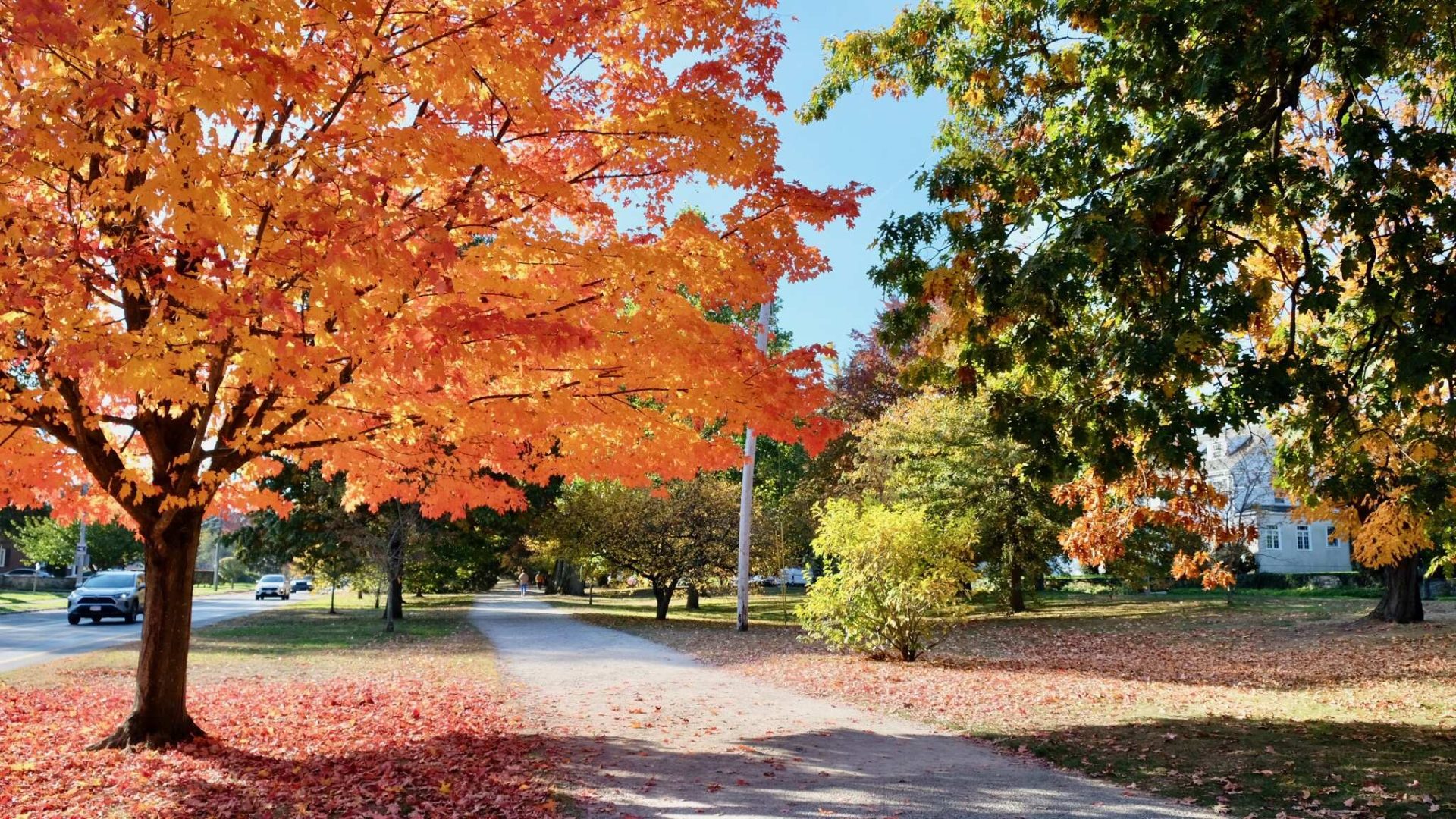
Why your hometown might have more charm than you remember—and how to uncover it. Kassondra Cloos finds she has more reasons to return to her hometown of Pawtucket, Rhode Island.


Why your hometown might have more charm than you remember—and how to uncover it. Kassondra Cloos finds she has more reasons to return to her hometown of Pawtucket, Rhode Island.
Like many, if not most, people, I could not wait to skip town after high school. My hometown, Pawtucket, Rhode Island, was littered with abandoned mill buildings and shuttered storefronts throughout my childhood, and I saw it as a has-been of industrial America. It felt claustrophobic, unimaginative, and left-behind.
But something interesting has happened as I’ve moved to increasingly ‘exciting’ cities elsewhere, including Boulder, Mexico City, and, now, London: I’ve started seeing my hometown in a more flattering light, too.
I don’t think this is an accident, though it helps that both Pawtucket and next-door Providence have been subjects of significant urban renewal in recent years. Unless my mother slipped me a magic ‘move home’ potion when I wasn’t looking, I think my recent wonder has been the result of an intentional process to learn how to appreciate the familiar. On each trip home for the last six years, I’ve made a point to find something new, as if I were visiting for the first time. And it’s been working: Now, I visit more out of desire than family obligation.
It all started when I joined a media tour for out-of-state journalists in 2018. I jumped at the opportunity to experience the touristy corners of the state we had mostly ignored as locals. Upon arrival, I realized that my home state was less like a close friend I’d lost touch with, and more like an acquaintance I’d never taken time to know. Everything looked familiar, but felt completely new.
For example, I had been to Newport plenty of times but had never stayed at a hotel there or ridden a bike around the city. I’d taken trips to Block Island, our own locals’ version of Nantucket, but I had never arrived by scenic prop plane. And while I’d spent many summer days with family in South County who lived close to the beach, I’d never stayed overnight at an age when I had freedom to go for a sunrise walk by myself.
If Google searches and ChatGPT queries fail to bring up new, exciting things you’ve missed before, dig deeper instead of casting a wider net. Retrace your steps to places you went as a child, and examine them with more mature eyes.
Of course, not everyone has the same opportunity to take a state-sponsored tour of their childhood stomping grounds. But I’ve worked to recreate this for myself on every trip home I’ve taken since then—and I’m pleased to say it works on any budget.
For starters, I suggest simply walking somewhere you’ve only ever driven. If that doesn’t feel safe where you are because it’s not pedestrian-friendly, try taking public transportation. And if that doesn’t exist where you’re from, go even more granular: Commit to seeing your neighborhood in a literal new light. Set your alarm early and stare, quietly and phone-free, as the sun ignites your surroundings.
If you’re disenchanted with home, it’s easy to assume you know it all and there’s nothing new to discover. But I can pretty much guarantee you’ll find something worth experiencing if you commit to approaching it with a mindset of adventure.
Instead of begging for a lift, I’ve spent many mornings walking the three miles between my parents’ house and downtown Providence which has allowed me to look more closely at historic corners I’d overlooked as a kid. I’ve defied locals’ warnings to avoid certain neighborhoods due to fears that are now outdated, and it’s paid off—I’ve found innovative and creative spaces like the Riffraff bookstore and bar, which hosts multiple authors every week, and the Hope Artiste Village, a collection of small businesses inside an old webbing mill.
If Google searches and ChatGPT queries fail to bring up new, exciting things you’ve missed before, dig deeper instead of casting a wider net. Retrace your steps to places you went as a child, and examine them with more mature eyes.
If you live in a rural area where there’s not much in the way of business, you might find interesting historical records at a library or historic preservation organization that allow you to see familiar landscapes from a new, more informed, perspective.
Extra credit to anyone who revisits a childhood field trip. Last weekend, I revisited my elementary school days with a trip to Pawtucket’s Slater Mill, which sparked the American Industrial Revolution. I learned that the site was donated to the National Park Service three years ago, and its new, now-free tours go much deeper into the fascinating yet problematic history of textile manufacturing in New England. I emerged with a new appreciation for the nuance of ‘progress’.
Eager to understand more, I went to the Pawtucket Public Library, which I frequented as a child. It took some pleading to gain access to the Rhode Island Collection, where irreplaceable and ‘ancient’ tomes (by local standards) are guarded in a locked room, but eventually they let me browse under the guidance of a helpful librarian. Inside was an incredible archive of hyper-local history, including old pamphlets mapping out walking tours of every neighborhood in the city.
I read up on the history of the building and found much to take pride in. Evidently, the place where I used to check out teen romance novels has been a leader in many inclusivity and access movements around the country. It was one of the first libraries in the country to allow patrons to browse open-access bookshelves; one of the first to allow children inside; and one of the first to open on Sundays, so that full-time mill workers could also have access.
While I am tempted to argue that this particular set of places is objectively the best, I know that I feel this way in large part because it is my set of places.
I’ve always been proud of Rhode Island’s quirks, of which there are many (ask a local about our obsession with low-number license plates, for starters). What’s new is this appreciation for what it feels like to physically be there, and how I spend my time when I visit.
On this most recent trip home, I must have had a hundred conversations—so far—with friends, family, and total strangers about what the state is like these days.
“Has Providence always been this cool?!” I keep asking. Almost without exception, the answer I get is a qualified yes: Rhode Island has always been a great place to live, people say, but in recent years, its creative scene has really been booming.
It’s hard to say whether I’m overhyping Rhode Island as a biased former local, or if it really is as cool as it seems to me right now. So, I asked Lucas Mann, who co-owns Riffraff with his wife, Ottavia De Luca. I explained my strategy for falling in love with one’s hometown and told him part of me is concerned that my plan isn’t actually replicable because Providence is objectively special. Maybe I’m just lucky that this is the place I get to call home.
“I do think Providence is the best,” he told me. He and De Luca moved to Rhode Island over a decade ago, but Mann was quick to say he still sometimes feels like a ‘tourist’. Born-and-raised locals can be very protective (read: stubborn) about who qualifies as a ‘true Rhode Islander’ (I have been one of these people).
We spent a long time talking about how much we love the city, and how much creativity has bubbled out of LitArts RI, a phenomenal organization for writers and podcasters that has taken the local scene by storm. “Probably a lot of what you’re saying is replicable, but I do think Providence is a special kind of place,” he said.
Lindsay Patnaude, a writer I recently met through LitArts RI who moved from Arizona six years ago, agrees with him. Rhode Island has a “sort of magic in the air that you don’t seem to find anywhere else,” she said.
“It’s easy for us to say our heroes make us feel like we are more than who we are, but it’s hard to say that a place makes you feel like you can be so much more than what you were born to be,” she told me. “Somehow, Rhode Island has a magic that seems to do that. It connects you to people and it gives you an abundance of creative opportunity and energy and space for everyone.”
We’re not the only ones who’ve caught on to how great Providence is, Mann said. Riffraff has hosted a number of nationally- and internationally-acclaimed authors, including Leslie Jamison and Tony Tulathimutte. Tulathimutte’s recent reading from Rejection, longlisted for the National Book Award, was one of the things that made me realize how much has been bubbling in the city while I’ve been away.
Providence has also recently garnered the attention of remote workers from places like New York City, who are attracted by smaller-city living within a short, three-hour train ride on Amtrak. Mann said Providence seems to have a good set of “checks and balances” to ensure local creators and homegrown businesses aren’t pushed away by out-of-staters, but of course the age-old battle ensues: More interest and investment means more cool people and more opportunity… but also, higher prices.
And so, as I write this now, I catch myself feeling bad for you, dear reader. I worry that you could do what I’ve done—walk every street, visit every park, Google every building—and still you won’t find the charm that I have, because I’m just lucky to have had so much to work with. I worry that my little city-state of Rhode Island has more to offer per square mile, and it’s so unique that anyone paying attention couldn’t possibly fail to see how amazing it is.
At the same time, that fierce loyalty kind of proves this whole point, doesn’t it? This is not the only place on Earth with charming architecture, lively bookstores, a colorful history, and an ever-changing cast of restaurants. While I am tempted to argue that this particular set of places is objectively the best, I know that I feel this way in large part because it is my set of places.
After all, neither Providence nor Rhode Island are new. Various aspects have been on the up and up for the last few years, but much of the state remains as it was 10, 25 and even 30 years ago, back when I said I hated it so much. All of these things I love now have always been here, in some capacity.
I just wasn’t paying attention.
***

Kassondra Cloos is a travel journalist from Rhode Island living in London, and Adventure.com's news and gear writer. Her work focuses on slow travel, urban outdoor spaces and human-powered adventure. She has written about kayaking across Scotland, dog sledding in Sweden and road tripping around Mexico. Her latest work appears in The Guardian, Backpacker and Outside, and she is currently section-hiking the 2,795-mile England Coast Path.






Can't find what you're looking for? Try using these tags: